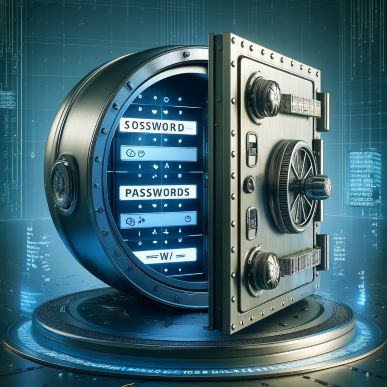Password Managers to Simplify Your Security
How to use password managers to make yourself more secure.

How a Password Manager Can Help
While you need to have a password to keep your accounts secure, managing them is a different ballgame. You may believe using simple, memorable passwords is secure or worse, using the same password you always use for every single site. However, this habit will make you a potential target for cybercriminals. That’s where a password manager comes into play – it’s a tool that makes your passwords secure and easy. Below is a brief overview of password managers and how they can help you.
What is a password manager
A password manager is a software application that allows you to store, generate, and manage passwords for your online accounts. Your password is stored on an encrypted database, often referred to as a “vault,” but you log into the entire vault with a master password to which others are authorized.
Benefits of Use
- Complex, unique passwords. Password managers will create complex, unique passwords for each account. Complex passwords are usually long and include a combination of letters and numbers and other special characters, making them difficult to remember. See what makes a strong password.
- Your convenience. Your password manager will remember the password for you so you don’t have to use it. And you won’t have to log in over and over again with a password. This not only speeds up your online endeavor but also eliminates the temptation to use the same password on each site you visit.
- Enhanced security. Your passwords are completely encrypted and stored, so no one can easily take them unless they have your primary key password. Most experienced password managers also deal with two-factor authentication, adding another way of protection.
- Accessibility. Password managers can be used on your mobile phone, tablet, or computer. Most of the prime password managers have cross-platform help, meaning you can carry it around on many devices.
How to choose a password manager:
When looking for a password manager, one might want to consider the following factors:
- Security: Choose a manager that uses proper encryption standards. As of now, AES-256 encryption is the strongest encryption.
- Ease of use: The manager should be easy to understand and navigate. If it complicates the task significantly, you will not want to use it.
- Reputation: One might as well only choose a manager with a good record. Such providers as Bitwarden, LastPass, and 1Password are particularly well-known for their security along with being user-friendly.
- Features: Look for options like password generation, secure sharing, emergency access, and 2FA. Depending on your needs, those features might be crucial for your experience and security.
- Price: The majority of the managers offer a limited free version. Whether the fee-based functions are worth the upgrade for you will depend on your needs and either personal or professional use.
Setting your first password manager:
Use the following steps to set up your first password manager:
- Choose your password manager: Download the software from a trustworthy source such as the provider’s official website or a reliable app store.
- Create your master password: the password should be the most complicated one you’ve ever made. It has to be lengthy and include a variety of characters. It should not replicate other types of information.
- Add your accounts: in case you have been using the export file from other managers or browsers, you could use this file. The managers generally have an import tool to support this part. The other way is to add the password each time you log in.
- Order your entries: for example, you could all your social media passwords in one directory and ones for banking – in the other.
Install Browser Extensions and Mobile Apps – For seamless integration, download the password manager’s extension onto your web browsers and the app onto your device. In conclusion, making the most of your password manager is one of the easiest ways to level up your online security. It manages itself, creates better online habits for you, and frees up your time. As new threats become more inventive, protecting yourself online is more critical than ever. A password manager is a straightforward way to achieve this.
How to Use It More Efficiently
- Change them regularly: Try to use them as a tool to generate new “secrets” now and then.
- Never send them via email or text message: Whenever you need to send one, do so by sharing it and let the service send it for you.
- Activate Two-Factor Authentication whenever possible. Not only on the service itself, but also on your password manager.
- Do not share your Master ‘password’ or “secret/salt”: And if you must, make sure your version is correctly stored.
Conclusion
Using a password manager may be one of the easiest things you can do to take your online security to the next level. A Password Manager, on the other hand, is intended to assist you with more than just passwords. Types of cyberomnia attacks have developed in complexity, risking our online identity is no longer an option; it is a must.